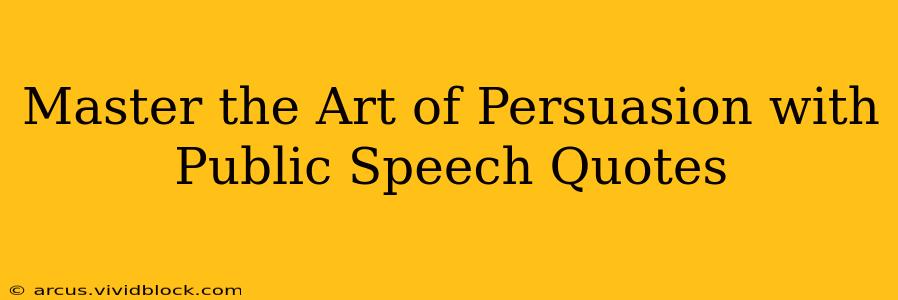Public speaking, the art of conveying ideas and influencing audiences, has captivated minds for centuries. From ancient orators to modern-day leaders, the power of persuasion through speech remains unparalleled. Mastering this art requires more than just eloquence; it demands strategic thinking, emotional intelligence, and a deep understanding of human psychology. This journey to becoming a persuasive speaker is significantly aided by learning from the masters, absorbing their wisdom through their impactful quotes.
What Makes a Persuasive Public Speaker?
Before diving into the quotes, let's establish the key elements that contribute to persuasive public speaking:
-
Strong Argumentation: A persuasive speech needs a clear, logical structure with compelling evidence supporting its claims. Facts, statistics, anecdotes, and examples all play crucial roles in bolstering your arguments.
-
Emotional Connection: While logic is important, appealing to the audience's emotions is equally vital. Passion, empathy, and storytelling are powerful tools for creating a connection and making your message resonate.
-
Credibility and Trust: Audiences are more likely to be persuaded by speakers they perceive as credible and trustworthy. This involves demonstrating expertise, honesty, and integrity.
-
Engaging Delivery: Your delivery style—tone of voice, body language, eye contact—significantly impacts how your message is received. A captivating delivery keeps the audience engaged and receptive.
-
Understanding Your Audience: Knowing your audience's background, values, and beliefs is paramount. Tailor your message to resonate with their specific needs and concerns.
Powerful Quotes to Ignite Your Persuasive Speaking
Now, let's explore some impactful quotes from renowned figures that encapsulate the essence of persuasive public speaking:
"The best way to persuade others is with your actions, not your words." - Unknown
This quote highlights the importance of authenticity and congruency. Your words must align with your actions to build trust and credibility with your audience. Inconsistency undermines your persuasive power.
"It is not enough to be a good speaker. You must also be a good listener." - Unknown
Active listening is fundamental. Understanding your audience's perspective and addressing their concerns allows you to tailor your message effectively, fostering connection and increasing persuasion.
"The most important thing in communication is hearing what isn't said." - Peter Drucker
Effective communication involves reading between the lines. Observing non-verbal cues and understanding unspoken concerns can profoundly impact your ability to connect with your audience and tailor your persuasive strategy.
"Words can inspire, words can comfort, words can wound." - Unknown
This quote emphasizes the power of language and highlights the responsibility that comes with it. Choose your words carefully to achieve your desired outcome.
"To persuade, appeal to the heart as well as to the head." - Unknown
This statement encapsulates the crucial role of emotional intelligence in persuasive speaking. While a logical argument is essential, connecting emotionally with your audience enhances their receptiveness to your message.
How can I improve my public speaking skills?
Improving your public speaking skills involves consistent practice and self-improvement. Consider joining a Toastmasters club, taking public speaking courses, recording and analyzing your speeches, and seeking constructive feedback from trusted sources. Practicing in front of a mirror, utilizing visualization techniques, and consistently working on your delivery will all contribute to your improvement.
What are some common public speaking mistakes to avoid?
Common mistakes include reading directly from notes, lacking eye contact, speaking too quickly or slowly, not engaging the audience, and failing to prepare adequately. Avoid using excessive jargon, focusing solely on yourself instead of your audience, and not practicing beforehand.
What are some tips for overcoming stage fright?
Overcoming stage fright requires preparation, practice, and a positive mindset. Techniques include deep breathing exercises, visualization, positive self-talk, and practicing your speech multiple times in front of a supportive audience. Remember, nervousness is normal; focus on connecting with your audience and your passion for your topic.
What are some effective techniques for engaging my audience?
Engagement techniques involve using storytelling, incorporating humor (appropriately), asking questions, using visuals, and actively seeking audience participation. Tailor your message to your audience's interests and make it relatable to their lives.
By incorporating these insights and learning from the wisdom embedded in these quotes, you can embark on a journey to refine your public speaking skills and master the art of persuasion. Remember, the art of persuasive speaking is a lifelong journey—a continuous process of learning, refining, and adapting your approach.

